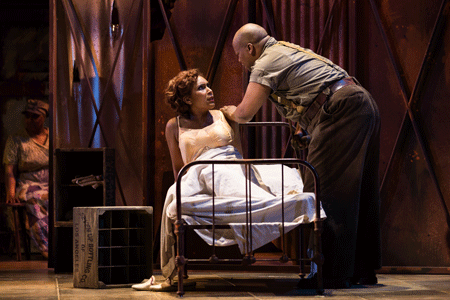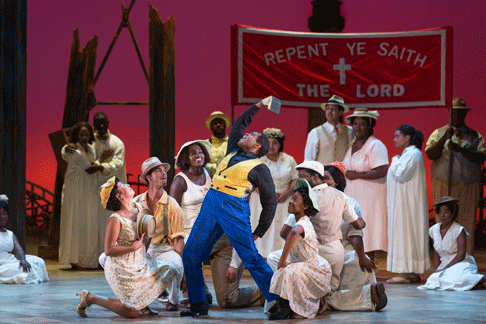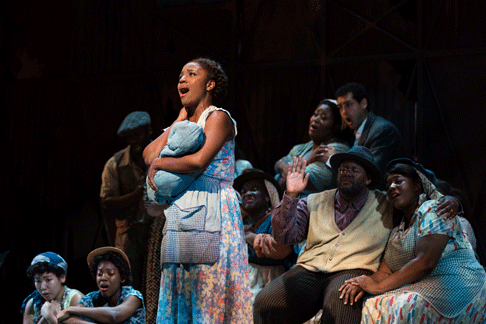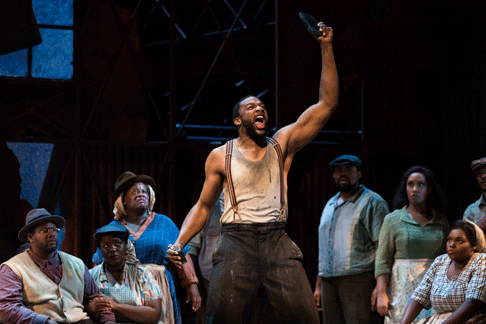
23 Aug 2017
American Masterpiece Conquers Cooperstown
If anything is more all-American than baseball, it just might be Gershwin’s Porgy and Bess, which scored a triumphant home run for the Glimmerglass Festival.
English Touring Opera are delighted to announce a season of lyric monodramas to tour nationally from October to December. The season features music for solo singer and piano by Argento, Britten, Tippett and Shostakovich with a bold and inventive approach to making opera during social distancing.
This tenth of ten Live from London concerts was in fact a recorded live performance from California. It was no less enjoyable for that, and it was also uplifting to learn that this wasn’t in fact the ‘last’ LfL event that we will be able to enjoy, courtesy of VOCES8 and their fellow vocal ensembles (more below …).
Ever since Wigmore Hall announced their superb series of autumn concerts, all streamed live and available free of charge, I’d been looking forward to this song recital by Ian Bostridge and Imogen Cooper.
Although Stile Antico’s programme article for their Live from London recital introduced their selection from the many treasures of the English Renaissance in the context of the theological debates and upheavals of the Tudor and Elizabethan years, their performance was more evocative of private chamber music than of public liturgy.
Evidently, face masks don’t stifle appreciative “Bravo!”s. And, reducing audience numbers doesn’t lower the volume of such acclamations. For, the audience at Wigmore Hall gave soprano Elizabeth Llewellyn and pianist Simon Lepper a greatly deserved warm reception and hearty response following this lunchtime recital of late-Romantic song.
For this week’s Live from London vocal recital we moved from the home of VOCES8, St Anne and St Agnes in the City of London, to Kings Place, where The Sixteen - who have been associate artists at the venue for some time - presented a programme of music and words bound together by the theme of ‘reflection’.
'Such is your divine Disposation that both you excellently understand, and royally entertaine the Exercise of Musicke.’
‘And there was war in heaven: Michael and his angels fought against the dragon; and the dragon fought and his angels, And prevailed not; neither was their place found any more in heaven … that old serpent … Satan, which deceiveth the whole world: he was cast out into the earth, and his angels were cast out with him.’
There was never any doubt that the fifth of the twelve Met Stars Live in Concert broadcasts was going to be a palpably intense and vivid event, as well as a musically stunning and theatrically enervating experience.
‘Love’ was the theme for this Live from London performance by Apollo5. Given the complexity and diversity of that human emotion, and Apollo5’s reputation for versatility and diverse repertoire, ranging from Renaissance choral music to jazz, from contemporary classical works to popular song, it was no surprise that their programme spanned 500 years and several musical styles.
The Academy of St Martin in the Fields have titled their autumn series of eight concerts - which are taking place at 5pm and 7.30pm on two Saturdays each month at their home venue in Trafalgar Square, and being filmed for streaming the following Thursday - ‘re:connect’.
The London Symphony Orchestra opened their Autumn 2020 season with a homage to Oliver Knussen, who died at the age of 66 in July 2018. The programme traced a national musical lineage through the twentieth century, from Britten to Knussen, on to Mark-Anthony Turnage, and entwining the LSO and Rattle too.
With the Live from London digital vocal festival entering the second half of the series, the festival’s host, VOCES8, returned to their home at St Annes and St Agnes in the City of London to present a sequence of ‘Choral Dances’ - vocal music inspired by dance, embracing diverse genres from the Renaissance madrigal to swing jazz.
Just a few unison string wriggles from the opening of Mozart’s overture to Le nozze di Figaro are enough to make any opera-lover perch on the edge of their seat, in excited anticipation of the drama in music to come, so there could be no other curtain-raiser for this Gala Concert at the Royal Opera House, the latest instalment from ‘their House’ to ‘our houses’.
"Before the ending of the day, creator of all things, we pray that, with your accustomed mercy, you may watch over us."
The doors at The Metropolitan Opera will not open to live audiences until 2021 at the earliest, and the likelihood of normal operatic life resuming in cities around the world looks but a distant dream at present. But, while we may not be invited from our homes into the opera house for some time yet, with its free daily screenings of past productions and its pay-per-view Met Stars Live in Concert series, the Met continues to bring opera into our homes.
Music-making at this year’s Grange Festival Opera may have fallen silent in June and July, but the country house and extensive grounds of The Grange provided an ideal setting for a weekend of twelve specially conceived ‘promenade’ performances encompassing music and dance.
There’s a “slide of harmony” and “all the bones leave your body at that moment and you collapse to the floor, it’s so extraordinary.”
“Music for a while, shall all your cares beguile.”
The hum of bees rising from myriad scented blooms; gentle strains of birdsong; the cheerful chatter of picnickers beside a still lake; decorous thwacks of leather on willow; song and music floating through the warm evening air.

If anything is more all-American than baseball, it just might be Gershwin’s Porgy and Bess, which scored a triumphant home run for the Glimmerglass Festival.
Francesca Zambello has had considerable success staging the piece for other notable companies, and as evidenced by this richly detailed production, she has honed her insights to a finely polished interpretation. Ms. Zambello occasionally likes to flavor her operas with musical comedy flair and it does not go amiss here.
When appropriate, she enlisted choreographer Eric Sean Fogel to lighten up the mood with well-considered moves that emerge organically from exuberant revelers. Mr. Fogel’s staged movement was not only entertaining in its own right, but also greatly deepened the violent, tragic moments by providing good contrast. The only false move was the series of woozy cakewalk kicks at the climax of There’s a Boat That’s Leavin’ Soon for New York. It seemed out of character to have a weakened, drugged up Bess this frolicsome as she is slimily lured against her will by the pimping Sportin’ Life.
Ms. Zambello’s Catfish Row is peopled by a bustling, believable vitality that communicated a powerful sense of community. When David Moody’s scrupulously prepared chorus launched into their many big choral numbers, the Thrill-o-Meter needle jumped off the charts. Francesca has built strong individual characterizations with each cast member, and has nurtured relationships that are marked by honesty and clarity. The sense of directorial focus and readily comprehensible storytelling that emerge out of this rich mosaic of dramatic moments is nothing short of brilliant.
 Frederick Ballentine as Sportin' Life with members of the ensemble
Frederick Ballentine as Sportin' Life with members of the ensemble
When Peter J. Davison’s imposing set is first revealed behind a front scrim, glowing hauntingly in Mark McCullough’s splendid lighting design, the audience burst into appreciative applause. Mr. Davison’s massive two story structure has rows of doors on each level, the upper balcony reached by a spiral staircase down right. This walkway extends to a large, barnlike building up left, with Porgy’s residence on ground level. A huge barn door, contained in the stage left wall, is opened and closed with import at key dramatic moments.
There is a wonderful chiaroscuro effect to the structures, the walls dotted and layered with rusting squares of sheet metal. For the storm scene, we are in a community hall with chairs and a table, defined as a huge wall flies in cutting the depth of the stage in half. Black plastic blows in the windows, augmented by Mr. McCullough’s threatening lightning. Sporadic dropping, banging and dangling of metal squares that had been “blown away” added fearful unpredictability to the chaotic effect.
The team has also “opened up” the action by flying in a partial wall and adding a bed to take us inside Porgy’s room. This allowed for a very focused private moment for both of the big duets. Another outstanding re-imagination was the conception of the Kittiwah Island setting as a neglected, gone to seed beachside amusement park. Sportin’ Life interrupts a holy roller baptism session to deliver his irreverent It Ain’t Necessarily So. To complete the dynamic look of the production, Paul Tazewell contributed the comprehensive costume design ranging from homely everyday attire, to Sunday-go-to-meetin’ finery, to splashes of garish color for Bess and Sportin’ life.
John DeMain kept things humming in the pit from the opening slashes of brass licks to the final stirring chorus. Under Maestro DeMain’s assured baton, this well-paced reading of Gershwin’s evergreen opera never sounded fresher. Having such a prodigiously talented cast sure didn’t hurt either.
 Meroë Khalia Adeeb as Clara
Meroë Khalia Adeeb as Clara
Musa Ngqungwana is such a force of nature as Porgy, with a voice of such jaw-dropping beauty, richness, and power that he just might become a household name. Practice saying Ngqungwana now, because his star is only going to go higher and higher. Musa has such a big, beaming, lovable open face that you are not quite prepared for his ferocity when he is goaded to confront evil. His painful limping gait, his superstitious negative fantasies, his loneliness, his compassion, his utter devotion to Bess; there is no aspect of this complicated role that he does not serve with uncommon distinction. If I had to comprise a short list of the show’s highlights, it would be: Whenever Musa Ngqungwana is on stage.
Talise Trevigne makes an equally strong case for Bess, bringing star power to her well-considered interpretation. Her confident, glimmering soprano beautifully encompassed some of the work’s best-known melodies. Ms. Trevigne brought committed acting to the mix, and she found all the necessary extremes to this unstable, emotionally volatile character. Her singing is pliable and expressive in all registers and volumes, and she judiciously uses her chest voice to serve the desperate lower pleas in What You Want With Bess? Talise and Musa are wonderfully paired, exuding a good chemistry. Bess, You Is My Woman Now was so heart rending to see, so ravishing to hear that I thought the show might never get going again from the prolonged, cheering ovation at its conclusion.
Norman Garrett’s incisive, booming bass and lanky, lean, mean intensity made for a knockout performance as Crown. Frederick Ballentine’s serpentine take on Sportin’ Life was relentless in his bad-ass persona. Although Mr. Ballentine’s dancing was fleet of foot and his secure tenor pleased the ear, we never forgot that beneath the cynical comic overtones in the music, there was an unrepentant, unwavering criminal. Serena has one of the most overtly “operatic” solos, and Simone Z. Paulwell’s throbbing, well-schooled soprano made My Man’s Gone Now a plangent lament marked by velvet tone and utter commitment.
 Norman Garrett as Crown
Norman Garrett as Crown
Meroe Khalia Adeeb has the most famous tune in the show, and her fresh, floated, silvery soprano made for a bewitching Summertime. Justin Austin’s honeyed baritone was well suited to the role of Jake. Chaz’men Williams-Ali has such a pleasing, vibrant tenor that it was a shame to lose him early on as the ill-fated Robbins. Happily, he snuck back in action later with a playful turn as the Crab Man. Judith Skinner struck just the right balance of brassy chest tones and cutting head voice to offer a well-rounded impersonation of Maria.
The enduring popularity of Porgy and Bess combined with the lovingly staged, magnificently performed production at hand deservedly made it a sell-out success. But I have to wonder, with all the stellar African-American talent filling the stage, where was the black audience? I wouldn’t even need to use all my fingers to count the African-Americans in the parterre seats at my performance. If opera is to sustain itself as an art form, it’s a question producers are going to have to answer. And if anyone can, my bet is on the resourceful Glimmerglass Festival.
James Sohre
Cast and production information:
Clara: Meroe Khalia Adeeb; Mingo: Steven D. Myles; Sportin’ Life: Frederick Ballentine; Jake: Justin Austin; Serena: Simone Z. Paulwell; Robbins: Chaz’men Williams-Ali; Jim: Nicholas Davis; Peter: Edward Graves; Lily: Gabriella H. Sam; Maria: Judith Skinner; Porgy: Musa Ngqungwana; Crown: Norman Garrett; Bess: Talise Trevigne; Detective: Zachary Owen; Policeman: Brent Michael Smith; Undertaker: Calvin Griffin; Annie: Briana Elyse Hunter; Nelson: Elliott Paige; Strawberry Woman: Jasmin White; Crab Man: Chaz’men Williams-Ali; Coroner: Chris Kjolhede; Scipio: Piers Shannon; Conductor: John DeMain; Director: Francesca Zambello; Choreographer: Eric Sean Fogel; Set Design: Peter J. Davison; Costume Design: Paul Tazewell; Lighting Design: Mark McCullough; Hair and Make-up Design: J. Jared Janas, Dave Bova; Chorus Master: David Moody